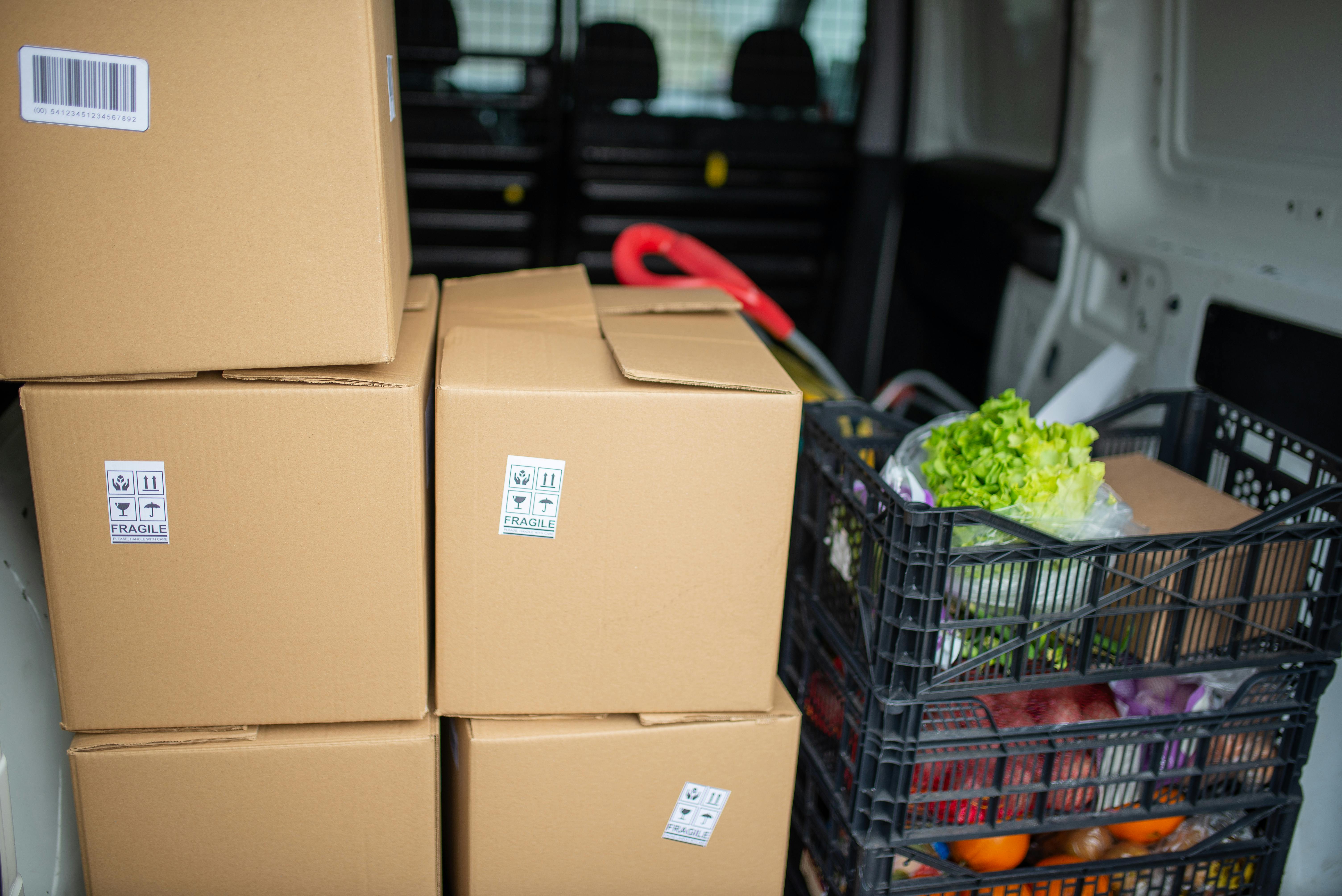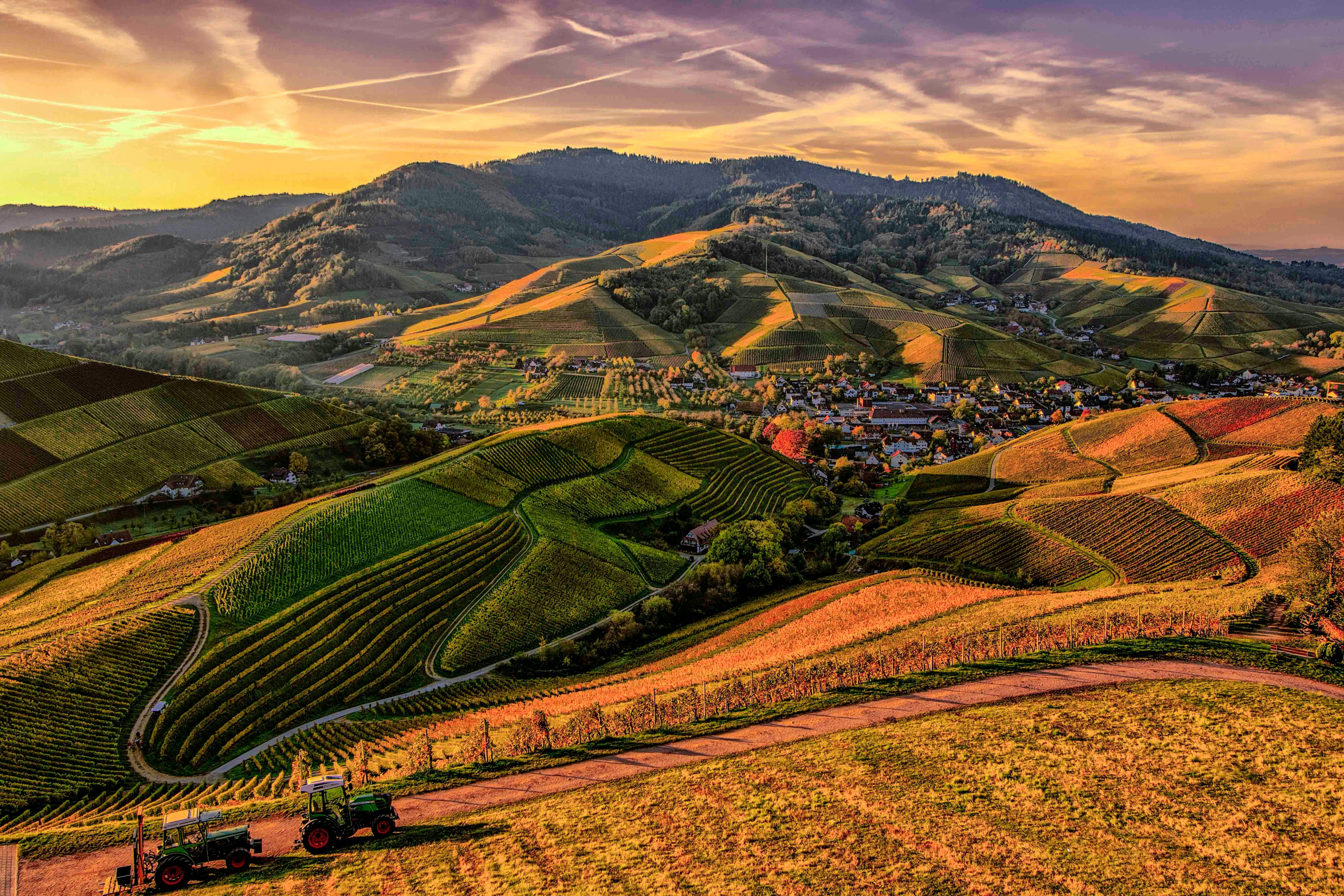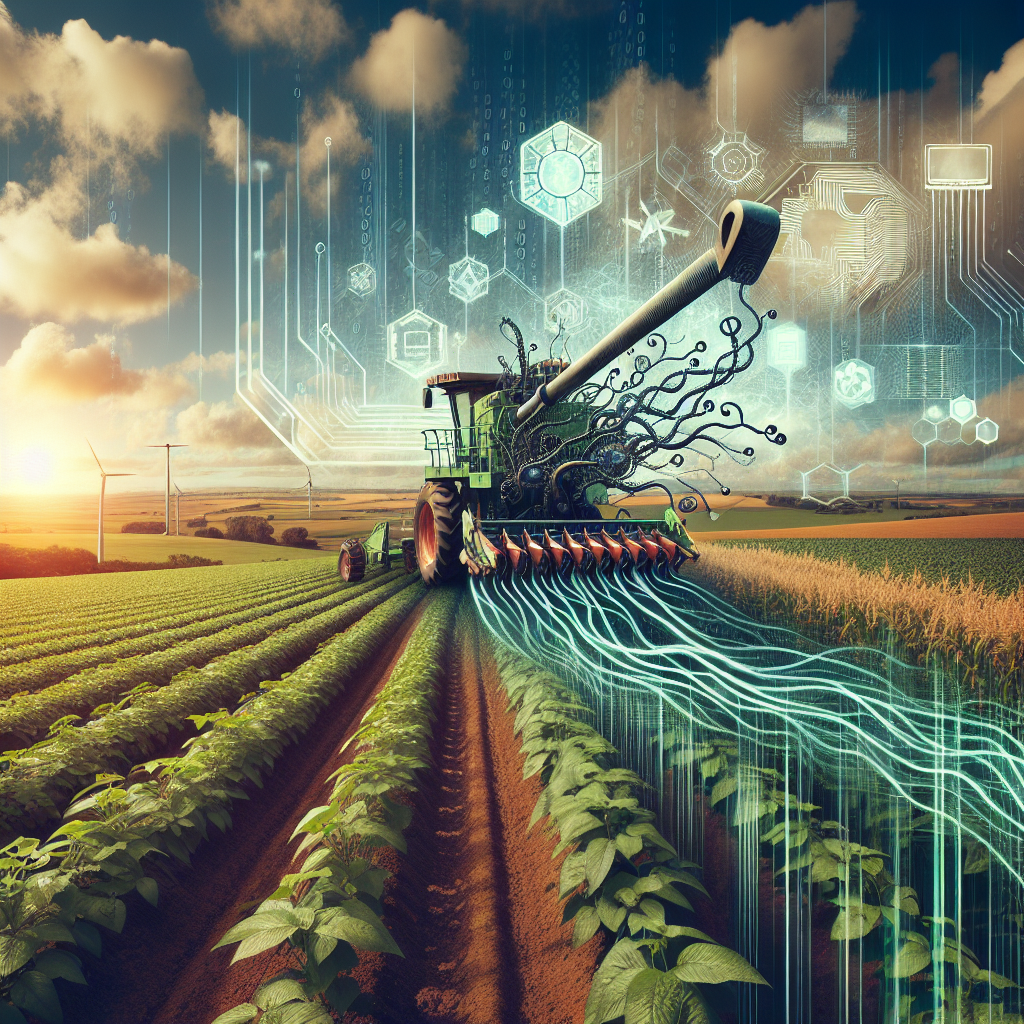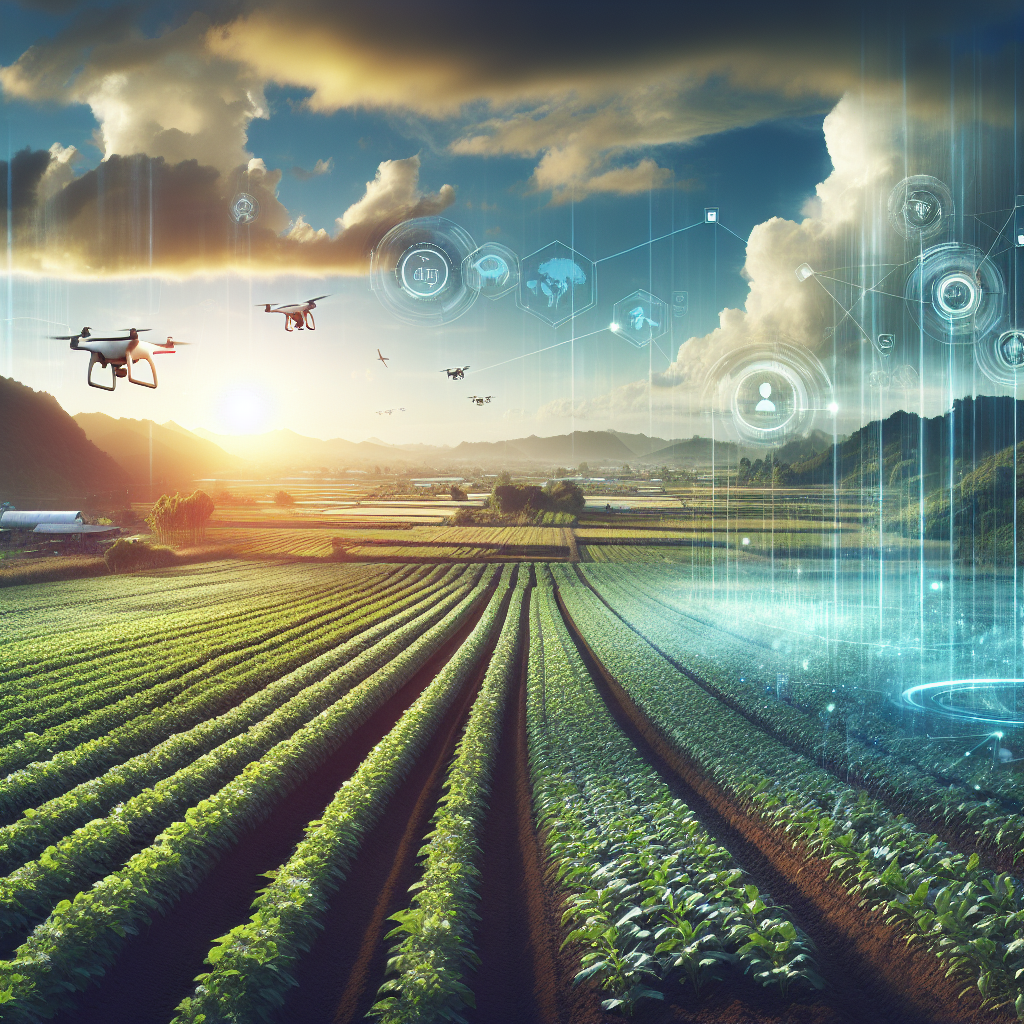Imagine a world where farmers have access to an array of advanced technologies that revolutionize the way they work. Azure, Microsoft’s cloud computing platform, is paving the way for this transformation in agriculture with its digital farming solutions. Through the power of Azure, farmers can now optimize every aspect of their operations, from crop monitoring and precision irrigation to livestock management and supply chain optimization. With Azure for Agriculture, the possibilities are endless as technology and farming unite to create a more sustainable and efficient future.

The Potential of Digital Farming
Digital farming, also known as precision agriculture, has the potential to revolutionize the agriculture industry. By leveraging advanced technologies like cloud computing, Internet of Things (IoT), and machine learning, digital farming offers several advantages over traditional farming methods. This article will explore the benefits of digital farming, the challenges in traditional agriculture, and the need for transformation.
Advantages of Digital Farming
Digital farming brings numerous advantages that can significantly improve the efficiency and productivity of agricultural practices. One of the key benefits is the ability to gather and analyze vast amounts of data from various sources such as weather stations, sensors, and satellite imagery. This data can then be processed using advanced analytics tools to gain valuable insights and make informed decisions.
Another advantage of digital farming is the real-time monitoring and control it offers. With IoT devices and sensors deployed across the farm, farmers can remotely monitor and manage critical factors like soil moisture levels, temperature, and humidity. This enables them to take immediate actions to optimize crop growth, reduce waste, and mitigate risks.
Furthermore, digital farming allows for precise application of resources such as water, fertilizers, and pesticides. By utilizing data-driven models and machine learning algorithms, farmers can accurately determine the amount and timing of these resources, thereby minimizing wastage and environmental impact. This precision also leads to better crop yields and improved overall farm profitability.

Challenges in Traditional Agriculture
Traditional agriculture faces several challenges that hinder its efficiency and sustainability. One of the main challenges is the lack of data-driven decision-making. In conventional farming, decisions are often based on experience, intuition, and generalized practices. This can result in suboptimal outcomes and inefficiencies, such as over-application of resources or inadequate pest control.
Another challenge faced by traditional agriculture is the limited ability to monitor and manage farm operations in real-time. For instance, it is difficult to promptly detect diseases or nutrient deficiencies in crops without advanced monitoring systems. Additionally, traditional farming methods often rely on manual labor, which can be time-consuming and prone to human error.
Furthermore, traditional agriculture is heavily reliant on physical labor and can be susceptible to the effects of climate change. Extreme weather events, such as droughts or floods, can have detrimental effects on crop yields and farm profitability. Traditional farming methods may not have the flexibility to adapt quickly to changing environmental conditions.
The Need for Transformation
Given the challenges faced by traditional agriculture and the advantages offered by digital farming, there is a clear need for transformation in the agriculture industry. Integrating advanced technologies like cloud computing and IoT into farming practices has the potential to address many of the limitations of traditional agriculture.
Digital farming can enable farmers to make data-driven decisions, optimize resource utilization, and implement real-time monitoring and control. This transformation can lead to increased efficiency, improved crop yields, reduced environmental impact, and enhanced food security.
To facilitate this transformation, farmers need access to reliable and scalable digital farming solutions. This is where Azure, Microsoft’s cloud computing platform, comes into play.

Introduction to Azure
What is Azure?
Azure is a cloud computing platform and service provided by Microsoft. It offers a wide range of services and tools that enable businesses to build, deploy, and manage applications and infrastructure on a global scale. With Azure, organizations can leverage the power of cloud computing to achieve greater scalability, reliability, and cost-efficiency.
Key Features of Azure
Azure offers numerous key features that make it an ideal platform for digital farming solutions. Some of the key features include:
-
High Scalability: Azure allows farmers to scale their resources up or down based on their needs, ensuring optimal performance and cost-effectiveness.
-
Global Availability: Azure has a vast network of data centers located across the world, enabling farmers to access their applications and data from anywhere.
-
Security and Compliance: Azure provides robust security measures to protect agricultural data and ensure compliance with industry regulations and standards.
-
Integrated Tools and Services: Azure offers a comprehensive suite of tools and services for data analytics, IoT, machine learning, and more, making it easier for farmers to develop and deploy digital farming solutions.
-
Cost-Effectiveness: Azure follows a pay-as-you-go pricing model, allowing farmers to only pay for the resources they use, thereby reducing upfront costs.
With these features, Azure provides a solid foundation for developing and implementing digital farming solutions.
Azure Solutions for Agriculture
Overview of Azure Solutions for Agriculture
Azure offers a range of solutions specifically designed for the agriculture industry. These solutions leverage Azure’s capabilities in IoT, data analytics, and machine learning to drive digital transformation in farming operations.
By utilizing these solutions, farmers can monitor and manage their farms in real-time, optimize resource allocation, and make data-driven decisions to improve yields and profitability.
Azure IoT for Farming
Azure IoT (Internet of Things) enables farmers to connect and manage their agricultural devices, sensors, and machines. This connectivity allows real-time data collection and monitoring of critical factors such as soil moisture, weather conditions, and equipment performance.
By leveraging Azure IoT, farmers can gain valuable insights into their farm operations, automate routine tasks, and optimize resource usage. For example, sensors can detect soil moisture levels and automatically trigger irrigation systems when necessary, ensuring efficient water usage and healthier crops.
Azure Machine Learning for Crop Prediction
Azure Machine Learning offers powerful tools and algorithms that can analyze large datasets and make accurate predictions. In agriculture, these capabilities can be utilized for crop prediction models, enabling farmers to forecast yields, identify disease outbreaks, and optimize harvest timings.
By analyzing historical weather patterns, soil conditions, and crop characteristics, Azure Machine Learning algorithms can provide valuable insights into crop growth patterns, optimize fertilization schedules, and minimize crop losses.

Benefits of Azure in Agriculture
Improved Data Management
One of the prime benefits of utilizing Azure in agriculture is enhanced data management. Azure provides secure and reliable storage solutions that can handle large volumes of agricultural data, such as weather records, crop growth data, and sensor readings.
With Azure, farmers can efficiently store, process, and analyze data to gain valuable insights into their operations. This data-driven approach enables them to make informed decisions regarding resource allocation, crop management, and risk mitigation.
Enhanced Efficiency and Productivity
By leveraging Azure’s automation and optimization capabilities, farmers can significantly enhance their farm’s efficiency and productivity. Azure’s machine learning algorithms can automate routine tasks, optimize resource usage, and improve yield prediction accuracy.
For example, by using historical data and machine learning models, farmers can determine the optimal amount of fertilizer needed for their crops, reducing waste and environmental impact. Similarly, automated monitoring and control systems can optimize irrigation schedules based on real-time data, conserving water resources and maximizing crop yields.
Real-time Monitoring and Control
Azure’s IoT capabilities enable farmers to monitor their farm operations in real-time, even from remote locations. By deploying sensors and connected devices throughout the farm, farmers can collect data on soil moisture, temperature, humidity, and more.
This real-time data can provide valuable insights into crop health, disease outbreaks, and equipment performance. Farmers can then take immediate actions to address any issues, such as adjusting irrigation or applying pest control measures. Real-time monitoring and control can save time, reduce losses, and ultimately improve farm profitability.
Implementing Azure in Farming Operations
Identifying Agricultural Challenges and Goals
Before implementing Azure in farming operations, farmers need to identify their specific challenges and goals. This could include issues like resource optimization, crop yield improvement, or reducing environmental impact.
By clearly defining the challenges and goals, farmers can better understand how Azure can address their specific needs. This understanding is crucial in choosing the right Azure services and solutions that align with their objectives.
Choosing the Right Azure Services
Azure offers a wide range of services and solutions, making it essential for farmers to choose the right ones for their unique requirements. Azure IoT, Azure Machine Learning, and Azure Storage are some of the core services that are commonly used in agriculture.
By evaluating their specific needs, farmers can determine which services are most relevant to their operations. This evaluation may involve factors such as the size of the farm, the types of crops grown, and the infrastructure available.
Data Collection and Integration
The success of implementing Azure in farming operations relies on the collection and integration of relevant data. Farmers need to identify the data sources that are critical for their operations, such as weather data, soil sensor readings, and historical crop yield records.
Azure provides various tools and services for data collection, storage, and integration. By leveraging these capabilities, farmers can ensure that their data is accurate, reliable, and accessible for analysis and decision-making.

Case Studies: Successful Azure Implementation
Case Study 1: Precision Agriculture with Azure
One successful case study of Azure implementation in agriculture is precision agriculture. A farm in Iowa, USA, implemented Azure IoT and Azure Machine Learning to optimize their crop management practices.
The farm deployed sensors throughout their fields to collect real-time data on soil moisture, temperature, and humidity. This data was fed into Azure IoT, which allowed the farmers to remotely monitor crop conditions and automatically control irrigation systems.
By leveraging Azure Machine Learning, the farmers developed a crop prediction model that analyzed historical weather patterns and soil conditions. This model enabled them to optimize fertilizer usage, adjust irrigation schedules, and predict yield more accurately.
As a result of implementing Azure, the farm experienced increased crop yields, reduced water usage, and improved overall farm profitability.
Case Study 2: Smart Irrigation using Azure IoT
Another successful application of Azure in agriculture is in smart irrigation systems. A farm in Australia implemented Azure IoT to optimize their irrigation practices and conserve water resources.
The farm installed sensors in their fields to measure soil moisture levels. These sensors were connected to Azure IoT, which allowed the farmers to monitor soil conditions in real-time. Using Azure’s automation capabilities, the farmers developed a smart irrigation system that adjusted water usage based on the soil moisture readings.
Through the smart irrigation system, the farm significantly reduced water wastage, improved crop health, and achieved more efficient resource utilization. The farmers could remotely control the irrigation system, saving time and ensuring timely irrigation without being physically present in the field.
Challenges and Limitations of Azure in Agriculture
Connectivity and Infrastructure Constraints
One of the challenges of implementing Azure in agriculture is the availability of reliable connectivity in rural areas. Farms situated in remote locations may struggle with limited or unstable internet connectivity, which can hinder the real-time data collection and communication required for digital farming solutions.
Additionally, the infrastructure required to deploy Azure IoT devices and sensors across large farms may present logistical challenges. Ensuring sufficient network coverage and power supply to support these devices can be a considerable task, particularly in expansive agricultural areas.
Cost and Affordability
Implementing Azure in agriculture may involve upfront costs, particularly for initial infrastructure setup and training. Farms may need to invest in IoT devices, sensors, and related equipment to collect the necessary data. Additionally, training staff on how to effectively use Azure services may also require financial investment.
However, it is essential to consider the long-term cost savings that can be achieved through the implementation of Azure. Optimized resource utilization, reduced input wastage, and improved crop yields can significantly impact the overall profitability of a farm, offsetting the initial investment.
Security and Data Privacy
With the increasing digitization of agricultural operations, security and data privacy become crucial concerns. Farmers need to ensure that their data is securely stored, transmitted, and processed within Azure. This requires implementing robust security measures and following best practices to protect sensitive agricultural data.
Additionally, compliance with data privacy regulations and industry standards is essential. Farmers need to be aware of the legal requirements regarding the collection, storage, and usage of agricultural data, ensuring that they adhere to these regulations when implementing Azure solutions.
Future Possibilities and Innovations
Emerging Technologies in Agriculture
The agriculture industry is continually evolving, and several emerging technologies have the potential to further transform farming practices. Some of these technologies include:
-
Blockchain: Blockchain technology can enhance traceability and transparency in the agricultural supply chain. It can enable farmers to securely record and track information about their crops, ensuring food safety and quality.
-
Remote Sensing: Advanced remote sensing technologies, such as drones and satellite imagery, can provide detailed information about crop health, soil conditions, and water distribution. Integrating Azure with these technologies can enable farmers to access actionable insights for precision farming.
-
Vertical Farming: Vertical farming, which utilizes hydroponics and controlled environment agriculture, offers the potential for year-round crop production in urban areas. By combining Azure’s analytics capabilities with vertical farming, farmers can optimize resource usage and maximize yields.
Integration of Azure with Robotics and Drones
Azure’s compatibility with robotics and drones opens up exciting possibilities for automation and data collection in agriculture. Robots equipped with AI-powered sensors can perform tasks like planting, weeding, and harvesting with precision and efficiency.
Drones equipped with remote sensing technologies can collect real-time data for mapping, monitoring, and analysis. This data, when integrated with Azure, can provide farmers with valuable insights into crop health, pest infestations, and environmental conditions.
By combining Azure’s cloud computing power with robotics and drones, farmers can streamline their operations, reduce labor costs, and make informed decisions for optimal crop management.
Harnessing Artificial Intelligence for Farming
Artificial Intelligence (AI) has the potential to revolutionize various aspects of farming. Azure’s machine learning capabilities can be harnessed to develop AI models that identify diseases, pests, and nutrient deficiencies in crops.
AI can also help farmers optimize their crop management practices by analyzing multiple data sources, such as climate data, soil conditions, and market trends. By utilizing AI-powered recommendations, farmers can make more accurate predictions, reduce risks, and improve overall farm performance.
Support and Resources for Azure Adoption
Training and Certification Programs
To facilitate the adoption of Azure in agriculture, Microsoft offers training and certification programs. These programs are designed to equip farmers and agricultural professionals with the skills and knowledge required to implement and manage Azure solutions effectively.
Farmers can attend online or in-person training courses to learn about Azure’s features, services, and best practices for their specific agricultural needs. By gaining Azure certifications, farmers can demonstrate their expertise in utilizing Azure for digital farming, enhancing their credibility in the industry.
Consulting Services and Partnerships
For farms that require additional support or specialized expertise, Microsoft offers consulting services and partnerships with industry experts. These services can help farmers in areas such as solution design, infrastructure setup, data analytics, and more.
Strategic partnerships with agricultural technology providers and system integrators can also facilitate the implementation of Azure in farming operations. These partnerships enable farmers to access customized solutions and receive ongoing support tailored to their specific requirements.
Online Communities and Forums
Microsoft maintains online communities and forums where farmers and agricultural professionals can connect, share knowledge, and seek advice on implementing Azure in agriculture. These communities provide a platform for collaboration, enabling farmers to learn from each other’s experiences and find solutions to common challenges.
Farmers can participate in discussion forums, access documentation and resources, and connect with Azure experts who can offer guidance and support. This thriving online ecosystem fosters innovation and the exchange of ideas, empowering farmers to leverage Azure’s potential in agriculture.
Conclusion
The potential of digital farming in transforming the agriculture industry is immense. By leveraging the capabilities of Azure, farmers can overcome the challenges of traditional agriculture and improve their efficiency, productivity, and sustainability.
Azure’s features, such as IoT, machine learning, and data analytics, enable farmers to collect and process vast amounts of data, make informed decisions, and optimize resource utilization. Real-time monitoring and control systems further enhance operational efficiency, reducing losses and improving overall farm profitability.
Although challenges exist, such as connectivity constraints and cost considerations, Azure provides a solid foundation for the future of digital farming. By embracing Azure’s capabilities, farmers can embark on a journey towards a digitized and enabled farming industry, driving innovation and sustainability in agriculture.